covers- BACCHUS #57/59


T wo covers from near the end of the six year run. I was trying for an icky insecty feeling on these Snooter covers. The first is finished in pastels on grey paper, the only time I ever employed that medium in a published work. It's not intentional, but the effect reminds me of old 1950s paperback covers. The second looks like I painted over a photocopy of the same drawing. I finally let Mick Evans throw out my old logo and design a new one for the last four issues. I was turning the book into more of a 'magazine', introducing typeset articles instead of comic book stories. I figured it was less time consuming to write than draw, given that I was doing a lot of travelling at this time (connected to the release of the From Hell movie). This would lead to the two issues of my actual magazine, Egomania. Mick was also contributing his own running series, and Bacchus #57 had the best page he ever drew. His character has just got a negative result on his HIV test:
*******
This piece from the New york Sun has got stuck in my head, being a review of Austin Grossman's "Soon I Will Be Invincible" (Pantheon)
Cannabalizing the Comic Book (sic) By BENJAMIN LYTAL- June 13,
Mr. Grossman clearly belongs to a new generation. His novel almost takes superhero comics at face value. Good opposes evil: On both sides, cybernetics, genetics and offworld intervention have variously combined to produce individuals with bulletproof skin and retractable rocket launchers. At first, Mr. Grossman seems to have caught a sincere tone of glory. Precisely 1,686 superpowered persons inhabit the earth:
"Of these, one hundred and twenty six are civilians leading normal lives. Thirty-eight are kept in research facilities funded by the Department of Defense, or foreign equivalents[. . . .] Twenty-nine are strictly localized—powerful trees and genii loci, the Great Sphinx and the Pyramid of Giza. Twentyfive are microscopic (including the Infinitesimal Seven)."
(link via Tom Spurgeon)
The following is related to my post of last saturday
Something has slipped into place in my noodle. I find myself more and more at odds with the common conception of the word 'comics'. For instance, the tenet that 'comics' and sequential art are interchangeable terms is of no use to me. The idea that all comics are the same medium I also exclude from my list of useful ideas. I have come to feel that comic books (which is a medium of American origin, and is quite different from similar popular media elsewhere e.g. France (Bande dessinee), Japan (manga), Britain (the comic paper), where the term 'comic book' is not traditionally used) are in fact a genre of popular ficton. If you click on 'genre fiction' in my sidebar you'll see that's where I've filed it, and if you check the Wikipedia entry on genre fiction, you'll find it's included there too. I'm sure that would be how Mr Grossman above was thinking when he wrote his book, and comic books can be translated into other media such as prose and film while still remaining essentially comic books. The comic strips in the newspapers are a type of cartoon native to their environment and have no relation whatsoever to comic books as they now exist. In fact, many newspaper comics are not 'sequential art'. Sequential art can be said to be one characteristic of the different species of 'comics', just as it is a characteristic that you will find in many other types of art and design. The McCloudian conception of 'comics' should also be filed under fiction, though it is not yet embraced by a genre. None of this should be misconstrued as a 'definition', though I have no doubt that within 24 hours it will be inserted into my wikipedia page as my 'defintion of comics' to replace whatever my previous 'definition' was even though I have said repeatedly I loathe definitions. By all means refer to it as my DESCRIPTION. It will change as the objects described change. This is my current map of the word 'comics' and I find it useful. If you don't like it, make your own.
And when you draw your own map, you may make some things closer neighbours than I have, but to your dismay you'll find that your map will not help you get there any quicker.
*******
in other news: (actually two months old)
Mystery cat takes regular bus to the shops
Labels: alec1, comics crit 1, covers-2, Snooter
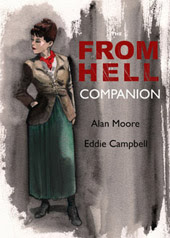
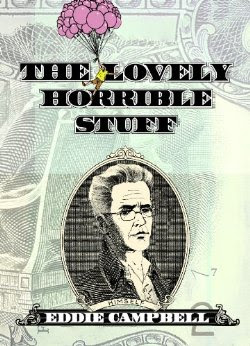

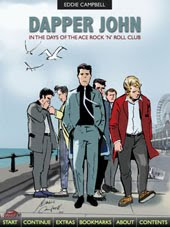
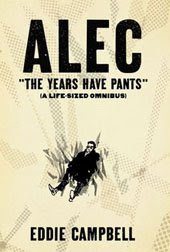
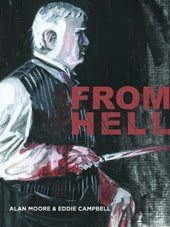
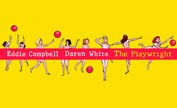
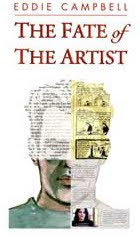
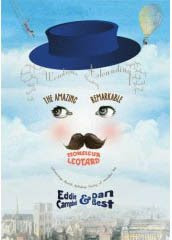
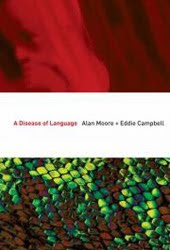
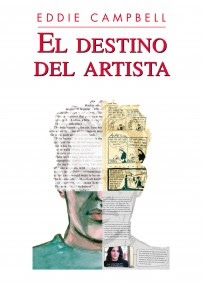
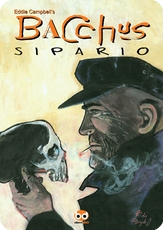
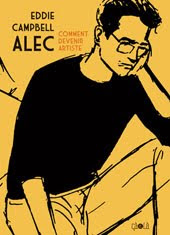

6 Comments:
"you'll find that your map will not help you get there any quicker."
Oh you are so right my dear Eddie, and for that matter, I don't know why you give the subject as much thought as you do. I've done so for the past year and the only conclusion I have come to, is that I should remove the entirety of those thoughts from my head and flush them down toilet. The only function they serve is to distract you from what you want to say with your art (and you know art well enough now that you can make it on faith in your own ability) and turn you into a technocrat. It was that kind of thinking that broke up the Beatles. Just kidding. If your stories suffers a flaw or two from working this way, all the better. Our best writers and artist most sincere works are flawed.
I just thought i would mention that i saw Hayley at the ICA bar tonight. I was going to say hello, but then i thought it a bit stupid and stalkerish. So please apologise on my behalf, from the balding short man with glasses that gurned at her. I had a simmilar experience in Angouleme two years ago, when i walked into the irish pub and you and your wife was at the bar. I still feel pleased with myself that i didn't approach with the dreaded, i really like your work. I do , and this blog is cool, but, i would have been so ashamed.
Sean Azzopardi
phatcatz.org.uk
Sean!
Am I that frightening?
Come say hello next time. You wouldn't have interrupted anything. I was probably just on another of my 'computer lettering should be banned' rants.
Did you notice that Richard Coyle was there? He was very nearly doing obscene things to Rian Hughes' leg he was so excited. Who would've guessed he was a fan...
H
This is my current map of the word 'comics' and I find it useful. If you don't like it, make your own.
Surely this is precisely what McCloud did with his description (call it that, rather than a definition, if you like -- it makes little difference, I think). The only difference is that McCloud's description has been widely embraced by a whole lot of people, from people who like superhero comic books (which seems to be roughly the meaning to the genre that Lytol used, and that you seemed to accept) to those who like some to those who don't like any: his description was not only useful (at least, I and lots of others found it so) but it was actually persuasive. To a very large number of people.
Which brings us to...
And when you draw your own map, you may make some things closer neighbours than I have, but to your dismay you'll find that your map will not help you get there any quicker.
...which is basically an empirical question, I suppose, although not one that is easy to measure or get consensus on. I will simply note that I think, strongly, that you are dead wrong about this: that in particular McCloud's definition has in fact shaped the map. I don't know that it's allowed works to be published that wouldn't have been otherwise (although I'd suspect it, indirectly), but it has unquestionably gotten people to read works -- works that you would deny are comics -- that they would otherwise have read: works such as those that you listed in the end of The Fate of the Artist.
People who normally see panels and word balloons and go yuch, comics, will think twice when you point out that film is a medium, and the fact that they didn't like Spider Man 3 has nothing at all to say about whether or not they'll like some other movie. If you deny that they're comics, on the other hand, they might buy it in the case of, say, the Codex Seraphinius, pages 39 & 41 -- but they will simply laugh at you in the cases of Chris Ware and Alison Bechdel and, well, Eddie Campbell. (Certainly Alex and From Hell, even if not The Fate of the Artist.)
I know this is true because I've seen it happen with people I know. I know this is true because -- in a rather partial form, really, since I always liked comics, but still, there were elements of it -- it happened with me.
What will be the effect of insisting that comics are superhero comics? And that graphic novels are something else, or that heck with it, they're all books?
You might, might, get people to read Gemma Bovary and the Fate of the Artist on the grounds that they're illustrated books. But for the most part you'll convince people that they can safely throw the vast majority of graphic novels -- just list your favorites here -- in the trash.
This is all assuming that utility is the criteria, and "if you don't like it, make your own" is the standard. If we adopt something more like a representational theory of truth, and the standard is accuracy to the world, I also think McCloud's description is more accurate than yours.
Once, in grad school, I was taking a seminar on the Holocaust where we read Maus. I was pretty clearly the only one in the room who had ever read anything else with words and sequential images recently. There was a fair amount of confusion, at first, about why Spiegelman would use the comic-book genre to write about the Holocaust. When I pointed out, simply, that comics was a medium and not a genre -- first, they immediately got what I meant; second, the point was persuasive (in a sentence, without any talk of definitions) -- on hearing it, they thought, yeah, that's right; and, finally -- and most importantly -- they could see the work more clearly. They could stop wondering what on earth Spiegelman was doing and start looking at what he'd done. It was clarifying: it allowed the work to be seen more accurately, more richly.
...I've drifted off the point I wanted to make, which was simply that if "make your own" is the standard then, well, McCloud did, and he did so far more persuasively than most. I don't think his definition is the One True Definition of Comics. I do think it has great utility -- whereas calling comic books a genre has negative utility: it distorts what people see when they look at art, it distorts what people see when they look at cultural history and it distorts what art they're willing to look at.
Stephen Frug
PS: ...unless, and this belatedly occurs to me, this is all about the word: and you'd be happy if we simply used the term "sequential art" instead of "comics", like you seem happier using the word "description" rather than "definition". In which case I think it's silly -- and reflective of an innacurate picture of the relation between meaning, use and etymology, as well as of how fast and in what way words change -- but I don't care. Call it what you like.
In the long comment above, at the end of the first paragraph after the second quote, for "The Fate of the Artist" read: "How to Be an Artist".
Also, I managed to misspell "inaccurate". Oops.
SF
Hayley
Not at all :)
I will say hi the next time.
I missed Richard Coyle, i hope he didn't leave a mess on Rians leg!
Post a Comment
Subscribe to Post Comments [Atom]
<< Home